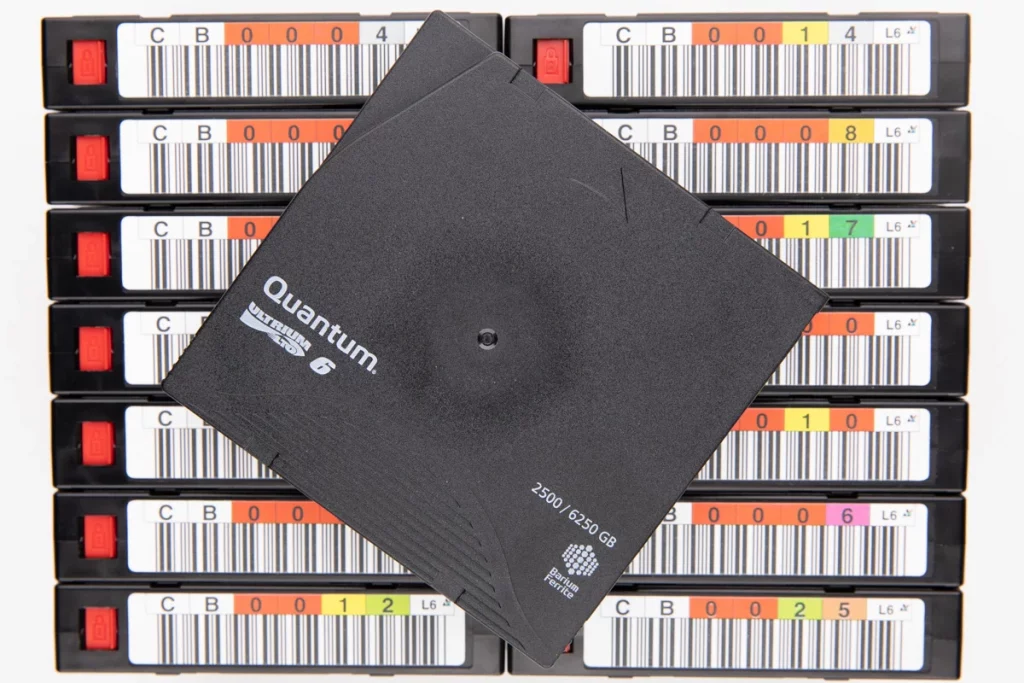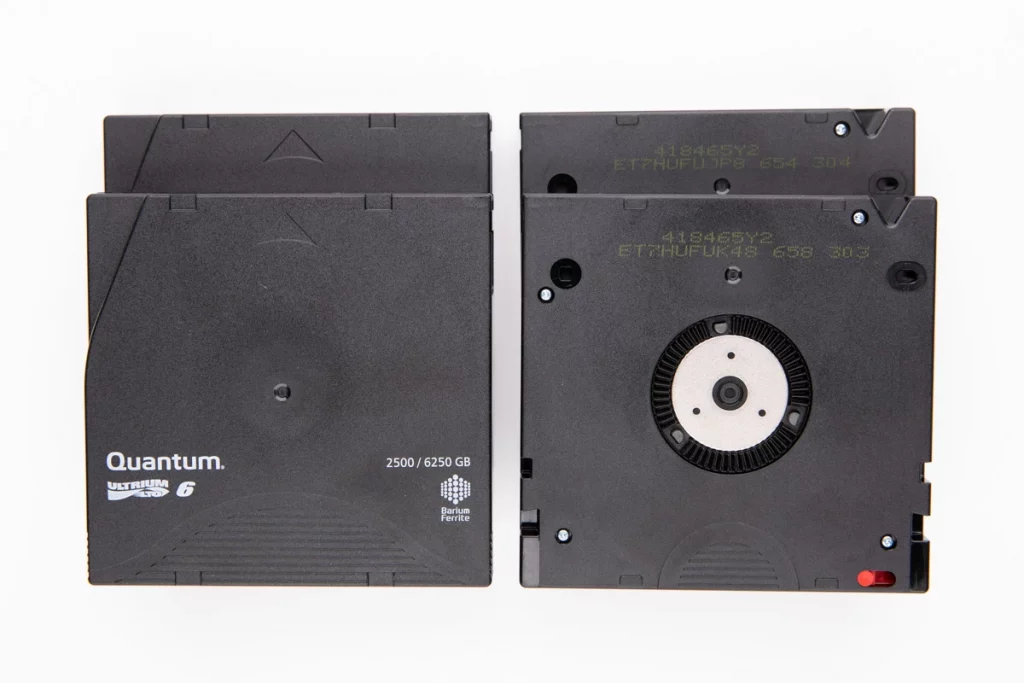Data loss in a business causes severe damage to its daily performance. To avoid all the consequences caused by data loss, it is essential to have a backup system in place. A reliable backup system allows you to restore data if something happens to the original files quickly.
Tape storage provides an effective solution with reliable backups to keep your data safe and secure. With tapes, your business will have peace of mind knowing that all confidential information is backed up and available when needed.
Tape Storage Basics
Tape storage, a tried-and-true method, has been a reliable form of data backup for decades. It operates by recording digital data on magnetic tape, similar to the way old video cassettes worked. Despite newer technologies, tape storage remains favored by large enterprises for its durability, cost-efficiency, and high capacity.
One of the principal advantages of tape is its shelf life; magnetic tapes can store data securely for up to 30 years under proper conditions. Tape storage is highly cost-efficient for archiving large volumes of data. This makes it an ideal choice for cost-conscious businesses looking to protect their data.
How Tape Storage Works
Tape storage is a trustworthy method for businesses to back up valuable data. This storage media works by using magnetic tape cartridges loaded into drives connected to computers. The drive then reads the data from the cartridge and writes new data to it, enabling businesses to store large amounts of information even if they do not have access to a hard drive or cloud service.
The use of tapes has become increasingly popular in recent years as businesses look for ways to ensure their data is protected from disasters such as floods, fires, and malware attacks.
Tape storage also provides an additional layer of protection against malicious actors who may attempt to gain access to business networks through hacking or other methods.

By storing backups on tapes, businesses can rest assured that if their systems are compromised, they will still have access to an off-site backup of their data. Tape backups allow enterprises to store large amounts of data without worrying about running out of space.

In addition to being used for backing up valuable files, many businesses rely on tape storage for archiving purposes. Archiving involves taking multiple copies of important documents regularly and storing them in separate locations, such as off-site warehouses, for long-term preservation.
By keeping these archives on tape cartridges instead of hard drives or other media formats, businesses can ensure that their documents will remain safe even if their primary source is lost or destroyed due to unforeseen circumstances.
Overall, the tape is an excellent way for businesses looking for a secure and cost-effective way of backing up their critical data. It offers easy scalability with larger capacity cartridges that can hold more information than ever before while still providing the same levels of reliability and security.
Main Advantages of Tape Backup
Reliable
Tape storage is incredibly durable and allows businesses to store their data without worrying about becoming inaccessible. Backup tapes are also quite reliable, making them an ideal choice for businesses with confidential data to protect. Not only do they have a long shelf life, but they are also highly resistant to external damage. This makes tape storage one of the best solutions for businesses of all sizes that need a dependable backup storage system.
Secure
Tape storage is considered a secure way of storing valuable data. Enterprises can encrypt tapes with unique codes, ensuring that only authorized personnel can access sensitive and confidential information. Additionally, tapes are difficult to tamper with, making it nearly impossible for unauthorized individuals to access or alter data stored on them. This makes them an excellent choice for businesses that must protect their data from external threats.
Cost Effective
Compared to other data storage forms, tapes are much more cost-effective. You can store more data on a single tape due to its high storage capacity than on hard disk-based systems or other devices. This function leads to less storage space being used, which reduces costs associated with hardware and management fees. Additionally, tapes are much cheaper than other media when it comes to initial and long-term maintenance costs.
Flexible
Tape storage systems provide excellent flexibility for users who need different levels of protection for their data backups. Tapes allow specifying how often backups should be performed (daily, weekly, monthly) as well as how long the data on a backup must be stored (days/weeks/months/years). This level of control is invaluable when dealing with sensitive information that needs regular backups and a secure archiving system over extended periods.
Durable
Tape storage is known for its durability; it does not require additional cooling mechanisms or power sources. They are not susceptible to physical damage either. Tapes are very stable; they are designed to last more than 30 years without experiencing any degradation in performance or quality due to wear and tear. In addition, tapes do not require frequent rewriting as hard disk drives. Hence, there is less chance of data loss due to overwriting errors.
Tape storage systems offer numerous advantages over other methods of backing up data. Overall, it is an excellent solution for businesses looking for reliable storage of their important information. When looking for an efficient way to protect your data from irreversible data loss, take a closer look at tape storage. You may find a perfect solution!
Frequently Asked Questions
Is tape still used for data storage?
Yes, tape is still used for data storage, especially for archival and backup purposes, due to its cost-effectiveness and longevity.
What are the disadvantages of data tape storage?
Due to its sequential access nature, data tape storage can be slower to access and recover than disk-based solutions.
Is tape storage slow?
Tape storage is slower for random access tasks compared to SSDs or HDDs, but it remains effective for sequential data access and backups.
How fast is tape storage?
Tape storage speed can vary, but modern LTO (Linear Tape-Open) versions offer speeds up to 360 MB/s, which is suitable for large-scale backups.
Is tape storage cheaper?
Yes, on a per GB basis, tape storage is generally cheaper than other alternatives, making it a cost-effective solution for long-term data storage.
Who uses tape the most?
The most common use of tape is by organizations that archive large amounts of data, such as media companies, government agencies, and cloud service providers.